The Routledge Handbook of Tourism and Sustainability
Editat de C. Michael Hall, Stefan Gossling, Daniel Scotten Limba Engleză Paperback – 25 mai 2017
is one of the winners of the ITB BookAwards 2016 in the category Specialist tourism literature!
Sustainability remains one of the major issues in tourism today. Concerns over climate and environmental change, the fallout from the global economic and financial crisis, and the seeming failure to meeting UN Millennium development goals have only reinforced the need for more sustainable approaches to tourism, however they be defined. Given the centrality of sustainability in tourism curricula, policies, research and practice it is therefore appropriate to prepare a state of the art handbook on the relationship between tourism and sustainability.
This timely Handbook of Tourism and Sustainability is developed from specifically commissioned original contributions from recognised authors in the field, providing a systematic guide to the current state of knowledge on this area. It is interdisciplinary in coverage and international in scope through its authorship and content. The volume commences with an assessment of tourism’s global environmental, e.g. climate, emissions, energy use, biodiversity, water use, land use, and socio-economic effects, e.g. economic impacts, employment and livelihoods, culture. This then provides the context for sections outlining the main theoretical frameworks and constructs that inform tourism and sustainability, management tools and approaches, and the approaches used in different tourism and travel industry sectors. The book concludes by examining emerging and future concerns in tourism and sustainability such as peak-oil, post-carbon tourism, green economy and transition tourism.
This is essential reading for students, researches and academics interested in the possibilities of sustainable forms of tourism and tourism’s contribution to sustainable development. Its assessment of tourism’s global impact along with its overviews of sectoral and management approaches will provide a benchmark by which the sustainability of tourism will be measured for years to come.
| Toate formatele și edițiile | Preț | Express |
|---|---|---|
| Paperback (1) | 443.66 lei 43-57 zile | |
| Taylor & Francis – 25 mai 2017 | 443.66 lei 43-57 zile | |
| Hardback (1) | 1220.57 lei 43-57 zile | |
| Taylor & Francis – 16 feb 2015 | 1220.57 lei 43-57 zile |
Preț: 443.66 lei
Preț vechi: 482.23 lei
-8% Nou
Puncte Express: 665
Preț estimativ în valută:
84.89€ • 88.87$ • 70.24£
84.89€ • 88.87$ • 70.24£
Carte tipărită la comandă
Livrare economică 07-21 aprilie
Preluare comenzi: 021 569.72.76
Specificații
ISBN-13: 9781138071476
ISBN-10: 1138071471
Pagini: 548
Ilustrații: 54
Dimensiuni: 174 x 246 x 39 mm
Greutate: 0.93 kg
Ediția:1
Editura: Taylor & Francis
Colecția Routledge
Locul publicării:Oxford, United Kingdom
ISBN-10: 1138071471
Pagini: 548
Ilustrații: 54
Dimensiuni: 174 x 246 x 39 mm
Greutate: 0.93 kg
Ediția:1
Editura: Taylor & Francis
Colecția Routledge
Locul publicării:Oxford, United Kingdom
Public țintă
PostgraduateCuprins
Section A: Introductory contexts to tourism and sustainability Section B: Theoretical frameworks and concepts in tourism and sustainability Section C: Management tools and concepts Section D: Sectoral approaches to tourism and sustainability Section E: Sustainable Transport and Mobility Section F: Emerging Issues and the Future
Recenzii
"In The Routledge Handbook of Tourism and Sustainable, Hall, Gössling and Scott have brought together leading scholars to create what may be the single most comprehensive resource on the concepts, debates and methodologies of sustainable tourism to date. This is a timely volume toward understanding tourism and its relationship to the increasing pressures of global environmental and social change in today's world."-Alan A. Lew, Ph.D., AICP, Professor and Graduate Program Coordinator, Department of Geography, Planning and Recreation, Northern Arizona University
"This comprehensive Handbook explores the conceptual foundations and management perspectives of sustainability in tourism. Engaging with well-argued criticism the book demonstrates the value and diversity of sustainable tourism studies. This collection is a ‘must have’ for scholars and students who want to understand the complexity and challenges of sustainable development in tourism." - Jarkko Saarinen, University of Oulu, Finland, and University of Johannesburg, South Africa
"This comprehensive Handbook explores the conceptual foundations and management perspectives of sustainability in tourism. Engaging with well-argued criticism the book demonstrates the value and diversity of sustainable tourism studies. This collection is a ‘must have’ for scholars and students who want to understand the complexity and challenges of sustainable development in tourism." - Jarkko Saarinen, University of Oulu, Finland, and University of Johannesburg, South Africa
Descriere
Sustainability remains one of the major issues in tourism today. Concerns over climate and environmental change, the fallout from the global economic and financial crisis, and the seeming failure to meeting UN Millennium development goals have only reinforced the need for more sustainable approaches to tourism, however they be defined. Given the centrality of sustainability in tourism curricula, policies, research and practice it is therefore appropriate to prepare a state of the art handbook on the relationship between tourism and sustainability.
This timely Handbook of Tourism and Sustainability is developed from specifically commissioned original contributions from recognised authors in the field. The handbook is interdisciplinary in coverage and is also international in scope through its authorship and content. The ‘start of the art’ orientation of the book in terms of both approaches to and management of tourism and sustainability as well as a global assessment of tourism’s impacts means that the book willbe a benchmark for any future assessment of the field.
This volume provides a systematic guide to the current state of knowledge on tourism and sustainability. It commences with a state-of-the-art assessment of tourism’s global environmental, e.g. climate, emissions, energy use, biodiversity, water use, land use, and socio-economic effects, e.g. economic impacts, employment and livelihoods, culture. The assessment then provides the context for the following sections that provide accounts of the main theoretical frameworks and constructs that inform tourism and sustainability, management tools and approaches, and the approaches used in different tourism and travel industry sectors. The book concludes with a section that examines emerging and future concerns in tourism and sustainability such as peak-oil, post-carbon tourism, green economy and transition tourism.
This is essential reading for students, researches and academics interested in the possibilities of sustainable forms of tourism and tourism’s contribution to sustainable development. It’s assessment of tourism’s global impact along with its overviews of sectoral and management approaches will provide a benchmark by which the sustainability of tourism will be measured for years to come.
This timely Handbook of Tourism and Sustainability is developed from specifically commissioned original contributions from recognised authors in the field. The handbook is interdisciplinary in coverage and is also international in scope through its authorship and content. The ‘start of the art’ orientation of the book in terms of both approaches to and management of tourism and sustainability as well as a global assessment of tourism’s impacts means that the book willbe a benchmark for any future assessment of the field.
This volume provides a systematic guide to the current state of knowledge on tourism and sustainability. It commences with a state-of-the-art assessment of tourism’s global environmental, e.g. climate, emissions, energy use, biodiversity, water use, land use, and socio-economic effects, e.g. economic impacts, employment and livelihoods, culture. The assessment then provides the context for the following sections that provide accounts of the main theoretical frameworks and constructs that inform tourism and sustainability, management tools and approaches, and the approaches used in different tourism and travel industry sectors. The book concludes with a section that examines emerging and future concerns in tourism and sustainability such as peak-oil, post-carbon tourism, green economy and transition tourism.
This is essential reading for students, researches and academics interested in the possibilities of sustainable forms of tourism and tourism’s contribution to sustainable development. It’s assessment of tourism’s global impact along with its overviews of sectoral and management approaches will provide a benchmark by which the sustainability of tourism will be measured for years to come.


















